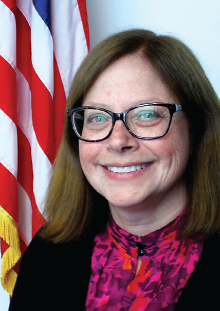APA Member McCance-Katz Confirmed for New HHS Leadership Position
Abstract
McCance-Katz will manage and direct SAMHSA and coordinate all programs and research related to mental illness and substance use disorders across federal agencies.
Elinore McCance-Katz, M.D., Ph.D., was sworn in last month as the first Assistant Secretary for Mental Health and Substance Use in the Department of Health and Human Services (HHS). She had been confirmed by the United States Senate earlier last month, along with Jerome Adams, M.D., M.P.H., who was confirmed as U.S. Surgeon General.

Both nominees were endorsed by APA. They were confirmed three days after a hearing by the Senate Committee on Health, Labor, and Pensions during which McCance-Katz and Adams both vowed to focus on the nation’s opioid crisis. Three other nominees for HHS leadership roles were also confirmed.
The confirmation of McCance-Katz, an APA member, is especially good news, bringing psychiatric leadership to a crucial new position at the Substance Abuse and Mental Health Services Administration (SAMHSA). She will manage and direct SAMHSA and coordinate mental health and substance use programs and research across the federal government. She previously served in SAMHSA as its first chief medical officer.
The post was created in the 21st Century Cures Act, a bipartisan bill that President Barack Obama signed into law in December 2016 in one of his last official acts as president.
“Our nation is afflicted by a crisis of opioid addiction, overdose, and death,” McCance-Katz said at the hearing. “Sadly, to a large extent, this is a crisis that has grown out of ill-informed and misguided attempts to address issues of pain. Data from the National Survey on Drug Use and Health tell us that 54 percent of misusers obtained opioid medications free from friends and relatives, while 34 percent admit to misusing opioids prescribed by their doctor for pain management.
“The data teach important lessons about prevention and treatment issues,” she said. “We must educate Americans on safe and appropriate use of pain medications. Innovative approaches to health care practitioner training should address effective pain management, identification, and treatment of substance use disorders as well as frequently co-occurring mental disorders. Increasing access to care and recovery services is critically important to addressing the opioid epidemic. Evidence-based medication-assisted treatment, peer specialists, and a growing array of community supports are essential underpinnings of recovery and form the basis of a collaborative care model that can best serve Americans.”
McCance-Katz also vowed to bring a renewed focus on services for people with serious mental illness. “For too long, the care and treatment needs of the most seriously mentally ill Americans have been neglected,” she told senators at the hearing. “SAMHSA national survey data indicate that 35 percent of Americans with the most serious mental illnesses receive no treatment whatsoever. In addressing this, SAMHSA must assure that program funding supports evidence-based early intervention, treatment, and recovery services. … We must focus on evidence-based services including psychiatric care, medication, and psychotherapy treatments in collaboration with peer support and other community-based services designed to provide the resources needed to assure the best possible outcomes. We must also work to include the families of those with serious mental illness in the discussion of their loved one’s needs.”
In a statement in response to the confirmation, APA CEO and Medical Director Saul Levin, M.D., M.P.A., called McCance-Katz an accomplished physician and the “ideal person to guide our nation’s treatment of mental health and substance use disorders.” He added, “We are delighted that the Senate confirmed her as Assistant Secretary for Mental Health and Substance Use. We look forward to working with her to provide quality mental health care to everyone who needs it.”
McCance-Katz had been the chief medical officer for the Rhode Island Department of Behavioral Healthcare, Developmental Disabilities, and Hospitals, and a professor of psychiatry and human behavior and a professor of behavioral and social sciences at the Alpert Medical School at Brown University.
Levin also hailed the confirmation of Adams for Surgeon General. “Dr. Adams has worked throughout his career to improve public health,” he said in a press release. “His expertise in combatting opioid addiction is particularly needed as physicians and elected officials work together to reduce the toll of this epidemic. On behalf of our 37,000 members, I congratulate Dr. Adams on his confirmation and look forward to working with him to improve the well-being of all Americans, including those needing treatment for mental health or substance use disorders. We commend him for ensuring that people with serious mental illness are a part of his agenda.”
Adams had been the Indiana State Health Commissioner.
As Surgeon General, Adams will emphasize prevention and health promotion, including at the community and employer levels, he said at the confirmation hearing
“We will not successfully tackle the opioid epidemic, or obesity, or health care access and cost if we continue to focus on how we handle these problems after they’ve taken hold. Much of our national focus is on providing care after a person has already developed a disease, but far too often this represents multiple missed—and more cost-effective—opportunities to have mitigated or even prevented the problem.”
Also confirmed by the Senate along with McCance-Katz and Adams were Lance Robertson for Assistant Secretary for Aging; Brett Grior, M.D., for Assistant Secretary for Health, and Robert Kadlec, M.D., for Assistant Secretary for Preparedness and Response. ■
The testimonies of McCance-Katz and Adams before the Senate Committee on Health, Labor, and Pensions can be accessed here.



